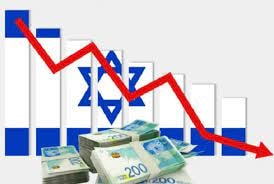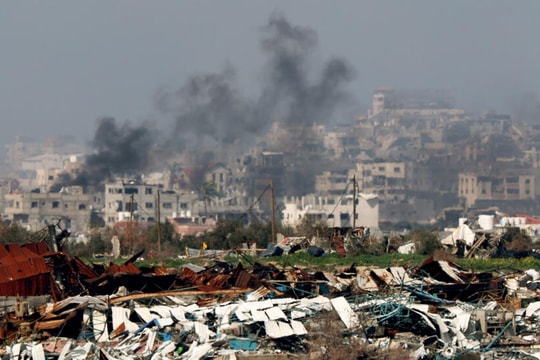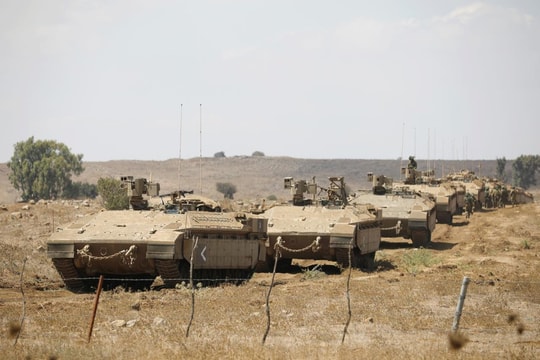Israel's economy suffers 'counterattack' from conflict
(Baonghean.vn) - According to data just released by the Israeli Central Bureau of Statistics, Israel's gross domestic product (GDP) in the fourth quarter of 2023 decreased by nearly 20% - marking the sharpest decline since the Covid-19 pandemic.
THE OPPOSITE NUMBERS
Before the conflict between Israel and Hamas broke out, the Israeli economy was on a relatively solid footing with a growth rate of 6.5% in 2022. The national debt/GDP ratio has fallen from 71% during the pandemic to 60% - significantly lower than other developed economies such as the US, UK... But the conflict that has lasted since October 2023 with Hamas is testing the strength of the Israeli economy, and the newly released data proves it. Accordingly, Israel's GDP fell 19.4% in the last quarter of last year - marking the deepest decline since the second quarter of 2020. At that time, the blockade orders related to the Covid-19 pandemic caused many Israeli businesses to close, people limited consumption, leading to an economic decline of nearly 30%. The decline is all the more remarkable given that the previous quarter—before Hamas’ surprise attack on Israeli territory—had maintained positive growth of 2.7%. The sharp decline in the Israeli economy is the result of many factors: Private consumption fell by nearly 27%, imports of goods and services fell by 18%, and investment in fixed assets fell by 68%, especially in housing construction. Meanwhile, government spending increased by 88% due to the cost of the war. In addition to direct spending on the conflict, the state has had to subsidize housing for Israelis evacuated from homes along the Gaza-Lebanon border, as well as provide financial support to workers and companies affected by the conflict. For the whole of 2023, Israel's GDP growth will be just 2.2% compared to an impressive 6.5% in 2022. But according to economic experts, the third quarter figures are not the worst for Israel if the conflict with Hamas continues as it is now. It is expected that in 2024, Israel's economic growth will be at risk of falling to its lowest level in history and by the end of 2025, the conflict is expected to cost Israel about 255 billion shekels ($70.3 billion), equivalent to about 13% of GDP.

The economic slowdown, coupled with rising political risks, led Moody's to recently downgrade Israel's credit rating for the first time from A1 to A2 and change its economic outlook to "negative" due to the risk of the conflict spilling over to Israel's northern front against the Lebanon-based militant group Hizbollah. However, a plus for the Israeli economy is that the government is showing good management, with economic activity improving significantly in December 2023 compared to the paralysis in the previous two months of October and November and possibly recovering slightly in the first quarter of this year.
"SAVIOR" OF THE ECONOMY
In a context where the economy is suffering from the negative effects of the conflict, Israel's technology sector has emerged as a bright spot, even being called the "savior" of the economy. The technology sector accounts for 18% of Israel's GDP, about half of the country's exports and 30% of tax revenue, making its prosperity important to the Israeli economy. In the fourth quarter of last year, about 15% of Israel's workforce - equivalent to nearly 300,000 people - was conscripted into the military. However, many reservists have now returned home, creating momentum for strong growth in the technology sector again.

Before the conflict broke out, amid a slowdown in fundraising for startups globally, Israeli tech companies had raised around $10 billion. Experts say that although the conflict has made fundraising more difficult, demand for Israeli tech companies’ services has remained high because the industry caters mainly to international clients. Israeli tech companies are now demonstrating incredible resilience and the ability to meet delivery deadlines and maintain business continuity. A major talking point is that the US-based Intel Corporation recently announced that it will continue with its plan to build a semiconductor chip factory in southern Israel with a total investment of up to $25 billion – the largest investment ever in Israel. In addition, the Israel-based global venture capital fund OurCrowd also said that a delegation of South Korean investors will arrive in the country in the next few days, despite the extremely difficult flight arrangements during the conflict. Israel still believes that the country is too important a part of the global technology ecosystem for the technology sector to overcome difficulties even if the Israel-Hamas conflict continues.
"SUPERREAL" ECONOMY?
However, the bright spot in technology is not enough to erase the negative outlook for the Israeli economy in the context of war. Immediately after Moody's announced the downgrade and changed the growth forecast for Israel, both Israeli Prime Minister Benjamin Netanyahu and Finance Minister Bezalel Smotrich dismissed the announcement as "bizarre and politically motivated", while repeatedly asserting the fundamental strength of the Israeli economy, and the current difficulties are only temporary. But even domestic experts in Israel have to admit that the national economy is not so "surreal" strong. Accordingly, the prolonged conflict with Hamas will become a significant long-term economic and political burden for the country, especially because of the way the government is managing the situation. Not only will it reduce economic growth, the conflict in the near future may also weaken the executive, legislative institutions and the national financial strength. It is also evident that the financial and diplomatic commitments of Israel’s closest ally, the United States, are not as solid as they were in the first three months of the war. Prime Minister Benjamin Netanyahu’s recent reference to the need for Israel to establish self-sufficiency in ammunition production suggests that he is aware of the risks in this area.

In addition, although most of Israel’s military reservists have returned home, statistics show that the lives of at least 600,000 people (about 6% of Israel’s total population) are being severely disrupted, businesses are facing financial difficulties and many people are losing their jobs. These will be major “minus points” to challenge Israel’s growth targets during the conflict.
The negative economic growth figures are a big challenge for leader Benjamin Netanyahu in the context of the country's military campaign in Gaza increasingly facing strong opposition from the international community. Even the closest ally, the US, has shown that it is losing patience and for the first time used the word "ceasefire" in a proposal recently sent to the United Nations Security Council. It can be seen that Mr. Netanyahu seems to be using the conflict as a way to maintain power, but with the unfavorable context both domestically and internationally, the ability to maintain power for himself and the Likud party is increasingly remote.



